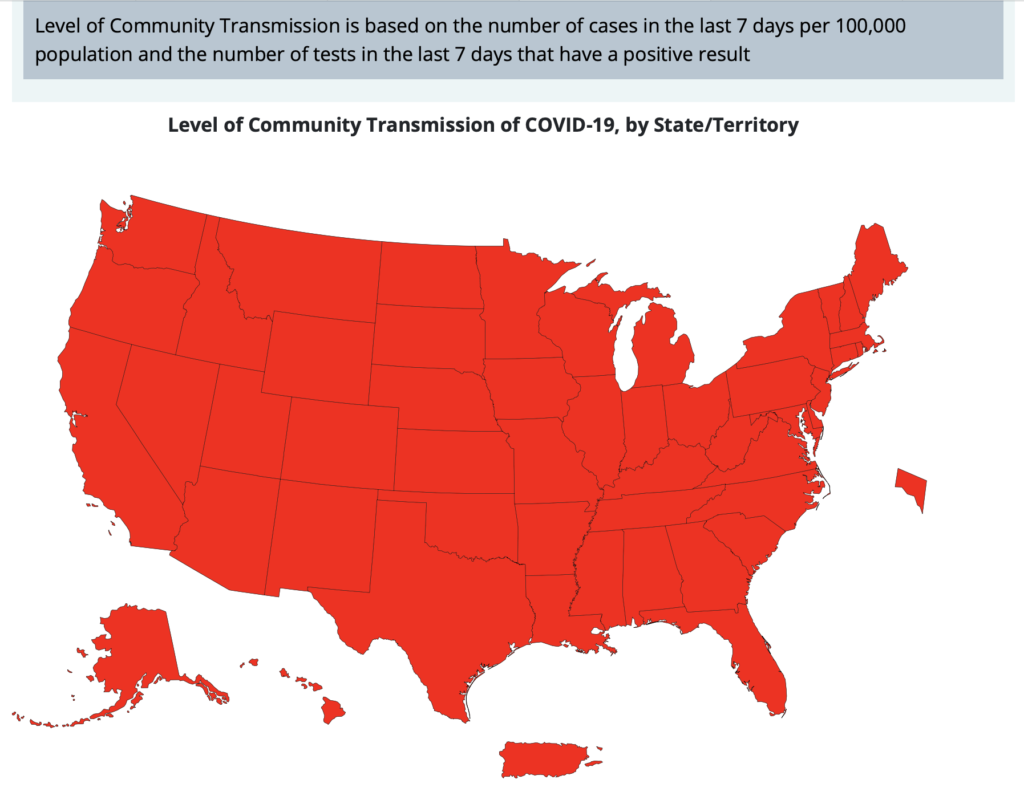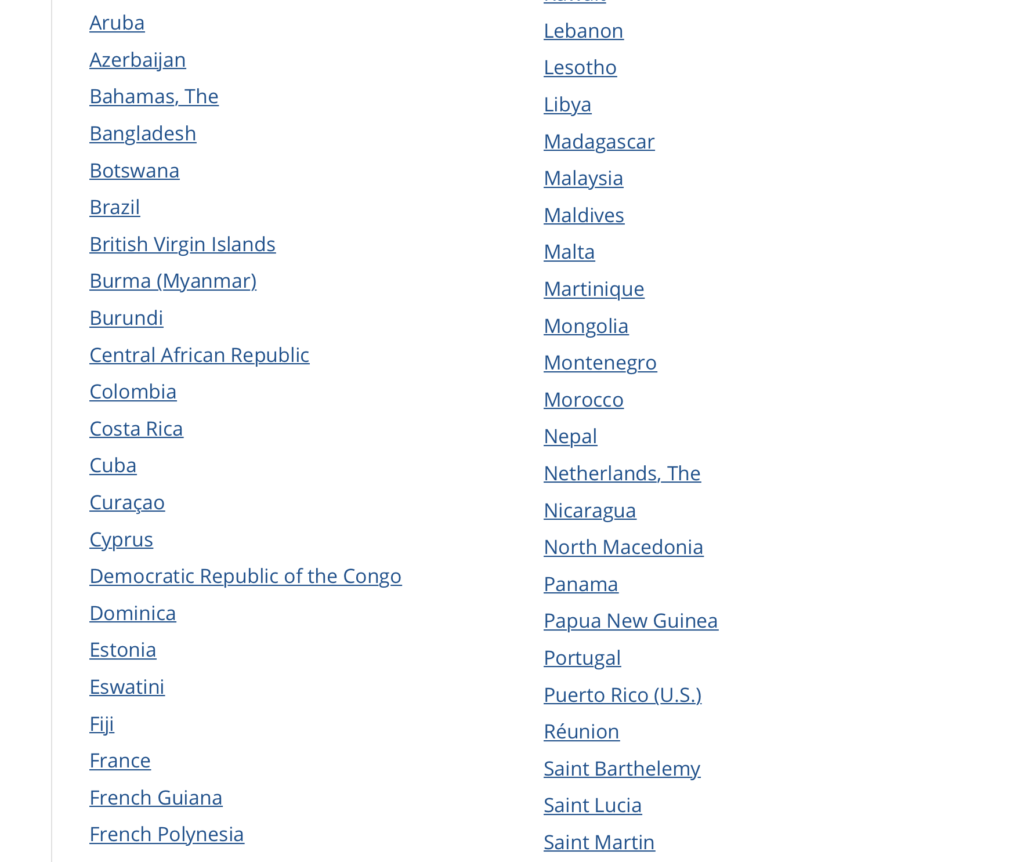News Is My Business boldly asked, “Is the CDC openly discriminating against Puerto Rico, USA?”
Not really.
The question comes up because Puerto Rico slipped into Level 4 — High Risk — as defined by the CDC, and was added to the CDC’s “don’t visit” list. News Is My Business is concerned about this because, as they say, “the impact on our island’s tourism will be pretty severe since anyone looking up what this CDC ‘Level 4’ means will see that it explicitly avoids travel to this destination.”
They’re right about all these things. They go on to point out, “Our analysis shows that Puerto Rico’s case growth is not even in the top 10, top 20, or top 30; Puerto Rico ranks #49. Yes #49…With 48 states above Puerto Rico’s current case percentage of 5.51%, representing a -4% decrease during the last 14 days, we wonder, with other 48 states above Puerto Rico, why the CDC did not issue a single Level 4 notice to any of those states.”
Is Puerto Rico higher risk than the states?
We’d say that Puerto Rico is not higher risk than any of the states. In fact, that’s what the CDC says, too. Note that the states and territories at Level 4 are all shown in red in the map below, from the CDC’s website:

The CDC is not saying that Puerto Rico is higher risk than the states. Until the Island moved up on the risk level earlier this week, it was listed as less risky. Level 4 risk is defined as having more than 500 new cases per 100,000 in population over the past 28 days. When Puerto Rico hit that threshold it joined the 50 states on the high-risk list for the U.S. It also was added to the destinations or foreign travel list.
So why is Puerto Rico on that list and the states are not?
The CDC says that its international travel advisories include “international destinations and U.S. territories.” Why does the CDC list U.S. territories under international travel? We don’t know. We can see from the screenshot below that they know Puerto Rico belongs to the U.S.

What’s more, Puerto Rico is also included on their page for domestic travel, which we show you in the screenshot showing the red map.
Confusion
It may be confusing to see Puerto Rico listed in foreign and domestic travel, but it reflects the confusion caused by Puerto Rico’s territorial status. Puerto Rico is an unincorporated territory of the United States. But people do refer to Puerto Rico as a country. That’s confusing. ‘
Maybe the CDC wants to make things clear for travelers who are confused about Puerto Rico. But we don’t think that they are intentionally discriminating against Puerto Rico.
We think it is high time Puerto Rico became a state. This would clear up the confusion. It would also help with many kinds of discrimination against Puerto Rico that we see every day: less federal funding than states, ineligibility for tax credits and federal programs, extra red tape associated with federal benefits, and disenfranchisement in presidential elections, for example.
Tell your representatives to support statehood for Puerto Rico.








One response
Just a few more examples:
1- An IRA account in PR cannot be transferred to any State in the Mainland as tax laws in PR different and PR IRS (Hacienda) controls the PR IRA Rules. Any responsible investment or brokerage firm in the USA will not accept it. Any responsible accountant and financial firm in PR will tell you that you cannot transfer a PR IRA account to the States.
2- Investments in the territory of PR are handled different. This is why the PR banks through PR Hacienda developed investments tools only offered in PR – this means that if you live in the States – you can invest in mutual funds, or stocks directly – the issue in PR is that for those investments to be taxed less in PR you have to use what the local banks offer – which have a very high cost and a very low performance rate. The IRA’s accounts offered in PR are very poor investment products and the consumer has no way around it because they reside in PR.
3- When a PR resident dies, if they have investments in stocks and mutual funds that do not comply with the PR – IRS laws – then, those are taxed very high which can cut down an inheritance by almost half- Residents in PR go around this by buying life insurances for similar values of their investments.
The issue is that PR residents should not have to do this. The average citizen in PR should have the same investments benefits that any State resident in terms of savings and investments tools. They are treated differently because they reside in PR and frankly, are at the mercy of whatever tax arrangements local banks have with PR Hacienda.
Bottom line- the local Puerto Rico banks benefit- but NOT the average citizen.
4- Credit cards offers in PR are limited as certain products cannot be offered in PR because of it’s tax territorial status.
5- PR Driver’s licenses – still create some problems in the States- because PR is a territory and not a state. A positive from a negative is that Hurricane Maria – opened the eyes to the mainland that PR is a territory and it’s residents are USA citizens – but they are still not quite considered the same.
6- Insurance Products are very limited. Most recent example -is the recent local PR insurance government requirements for condominiums owners- There are only a handful of insurance companies in PR that are truly solvent which limits the options for Puerto Rico’s consumers. The local PR government through their insurance commissioner also created an added cost per insurance transaction – this means that anyone having a home loan in PR has very limited options to ensure the home and pay for the condo infrastructure insurance without adding extra charges to their mortgages.
Bottom line- The local insurance industry benefits but NOT the average citizen with very limited options.
PR has many problems:
Infrastructural: Energy, Water etc…
Lack of economic growth,
Decreased working population,
Government size and government dependency of all sectors,
Poor administrative and legislative representatives for decades,
Individual & public sector corruption,
Poorly run government agencies with misuse of federal funds , etc….
The core of all the problems – is the territorial status which prevents PR from operating at it’s maximum potential linked with the USA.
An independent PR will have to deal with countries that are in turmoil and have similar, if not, worse problems.
The average PR resident simply has to struggle to get by, with an expensive poor quality of life.
At the end, it is their choice (through their votes and electorate power) to continue as … or not!